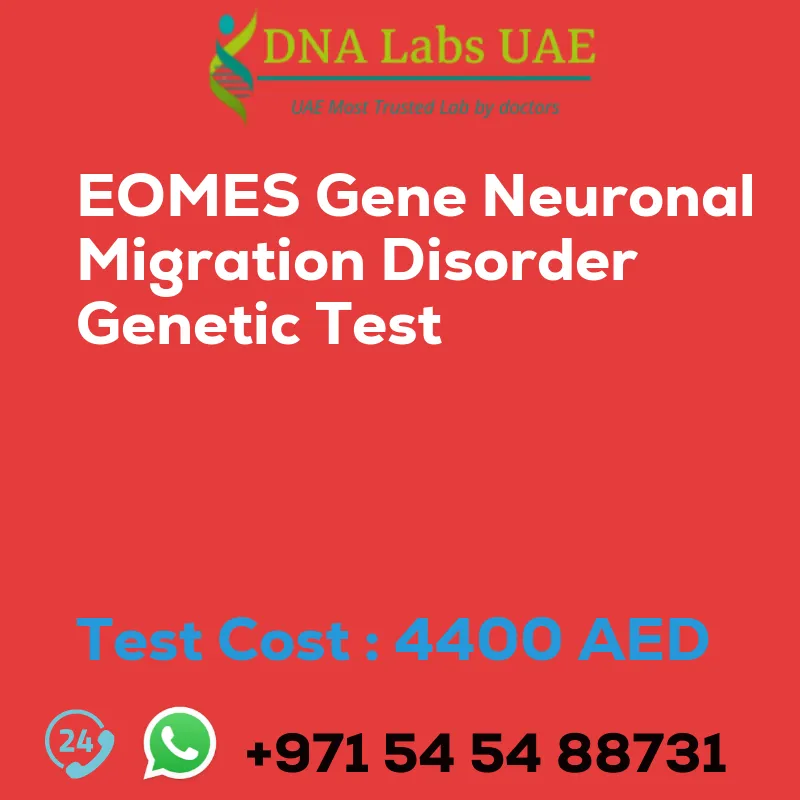EOMES Gene Neuronal Migration Disorder Genetic Test
At DNA Labs UAE, we offer the EOMES Gene Neuronal Migration Disorder Genetic Test at a cost of AED 4400.0. This test is designed to diagnose and identify the genetic cause of neuronal migration disorder associated with mutations in the EOMES gene.
Test Components and Details
- Test Name: EOMES Gene Neuronal Migration Disorder Genetic Test
- Price: AED 4400.0
- Sample Condition: Blood or Extracted DNA or One drop Blood on FTA Card
- Report Delivery: 3 to 4 Weeks
- Method: NGS Technology
- Test Type: Neurological Disorders
- Doctor: Neurologist
- Test Department: Genetics
Pre Test Information
Prior to undergoing the EOMES Gene Neuronal Migration Disorder Genetic Test, it is important to provide the clinical history of the patient. Additionally, a genetic counseling session will be conducted to draw a pedigree chart of family members affected with EOMES Gene Neuronal Migration Disorder.
About EOMES Gene Neuronal Migration Disorder
EOMES (eomesodermin) gene neuronal migration disorder is a genetic condition that affects the development and migration of neurons in the brain. It is caused by mutations in the EOMES gene, which plays a crucial role in the normal development of the brain. Neuronal migration is a vital process in which nerve cells move to their proper locations in the brain during embryonic development, forming the brain’s structure and function. Mutations in the EOMES gene can disrupt this process, leading to abnormal neuronal migration and subsequent neurological problems.
NGS Technology and Genetic Testing
NGS (next-generation sequencing) genetic testing is a cutting-edge technique that allows for the simultaneous analysis of multiple genes. In the context of EOMES gene neuronal migration disorder, NGS genetic testing can identify mutations in the EOMES gene that may be responsible for the condition. This test aids in the diagnosis of affected individuals and provides them with appropriate medical management and genetic counseling.
Test Procedure
NGS genetic testing for EOMES gene neuronal migration disorder involves obtaining a DNA sample, usually from blood or saliva. This sample is then analyzed using specialized sequencing techniques. The DNA sequence data is compared to a reference sequence to identify any variations or mutations in the EOMES gene.
Implications and Benefits of Test Results
The results of NGS genetic testing can provide valuable information to healthcare providers and genetic counselors. These results can guide treatment decisions, offer insights into the risk of the condition in other family members, and provide reproductive options for affected individuals and their families. It is important to note that NGS genetic testing may not detect all possible mutations in the EOMES gene, as technology continues to evolve and new mutations may be discovered over time. Therefore, it is crucial to consult with a healthcare professional or genetic counselor to fully understand the implications of the test results.
At DNA Labs UAE, we are committed to providing accurate and reliable genetic testing services. Our EOMES Gene Neuronal Migration Disorder Genetic Test can help diagnose and manage this condition effectively. Contact us today to schedule an appointment or learn more about our services.
| Test Name | EOMES Gene Neuronal migration disorder Genetic Test |
|---|---|
| Components | |
| Price | 4400.0 AED |
| Sample Condition | Blood or Extracted DNA or One drop Blood on FTA Card o |
| Report Delivery | 3 to 4 Weeks |
| Method | NGS Technology |
| Test type | Neurological Disorders |
| Doctor | Neurologist |
| Test Department: | Genetics |
| Pre Test Information | Clinical History of Patient who is going for EOMES Gene Neuronal migration disorder NGS Genetic DNA Test A Genetic Counselling session to draw a pedigree chart of family members affected with EOMES Gene Neuronal migration disorder |
| Test Details |
EOMES (eomesodermin) gene neuronal migration disorder is a genetic condition that affects the development and migration of neurons in the brain. It is caused by mutations in the EOMES gene, which provides instructions for making a protein that is important for the normal development of the brain. Neuronal migration is the process by which nerve cells, or neurons, move to their proper locations in the brain during embryonic development. This process is crucial for the formation of the brain’s structure and function. Mutations in the EOMES gene can disrupt this process, leading to abnormal neuronal migration and subsequent neurological problems. NGS (next-generation sequencing) genetic testing is a type of genetic test that uses advanced sequencing technologies to analyze multiple genes simultaneously. In the context of EOMES gene neuronal migration disorder, NGS genetic testing can be used to identify mutations in the EOMES gene that may be causing the condition. This testing can help in diagnosing individuals with the disorder and providing them with appropriate medical management and genetic counseling. NGS genetic testing for EOMES gene neuronal migration disorder typically involves obtaining a sample of DNA, usually from blood or saliva, and analyzing it using specialized sequencing techniques. The DNA sequence data is then compared to a reference sequence to identify any variations or mutations in the EOMES gene. The results of NGS genetic testing can help healthcare providers and genetic counselors understand the genetic cause of EOMES gene neuronal migration disorder in an individual. This information can be used to guide treatment decisions, provide information about the risk of the condition in other family members, and offer reproductive options for affected individuals and their families. It is important to note that NGS genetic testing may not detect all possible mutations in the EOMES gene, as the technology is constantly evolving and new mutations may be discovered over time. Additionally, the interpretation of test results requires expertise in genetics and neurology, so it is important to consult with a healthcare professional or genetic counselor to fully understand the implications of the test results. |








